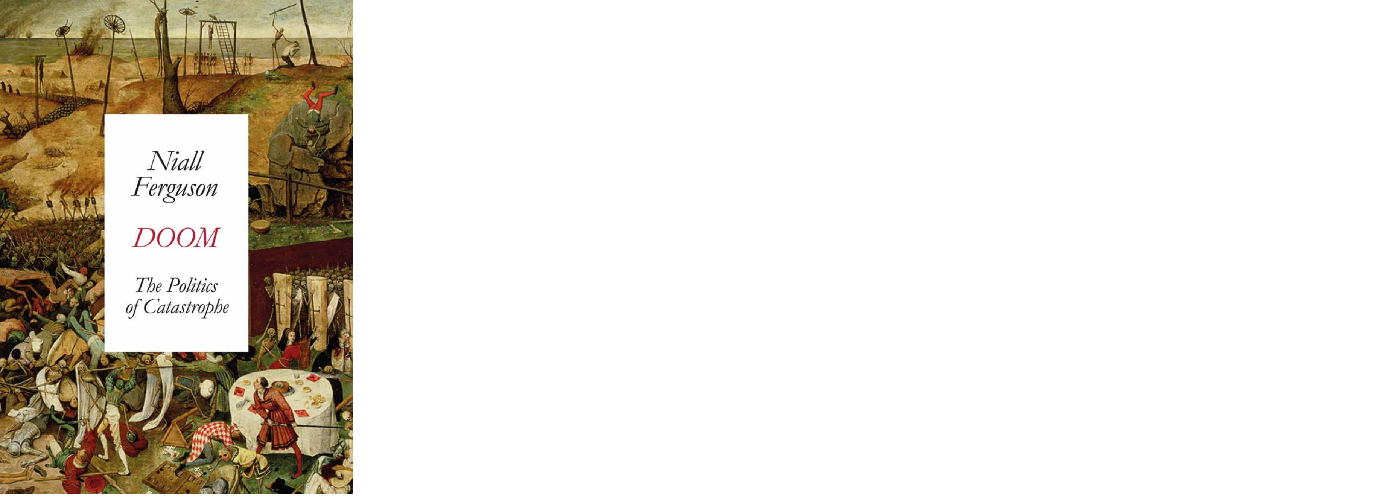Book of the week: Doom
The Scottish-born Harvard historian Niall Ferguson has put the pandemic in the historical context of catastrophes
A free daily email with the biggest news stories of the day – and the best features from TheWeek.com
You are now subscribed
Your newsletter sign-up was successful
While the rest of us spent lockdown learning to bake sourdough, Niall Ferguson applied his “prodigious intellect” to the task of placing the pandemic in historical context, said Douglas Alexander in the FT. In Doom, the Scottish-born Harvard historian sets out to “understand why humanity, time and again through the ages, has failed to prepare for catastrophe”.
Ferguson’s inquiry is “dazzlingly broad”, covering a host of natural and man-made disasters – Vesuvius, wars, famine, Chernobyl – and takes in disciplines ranging from network science to epidemiology. Insofar as the book has an “overall thesis”, it is that disasters are usually less the product of poor leadership than of “vulnerabilities of the system”. America’s nearly 600,000 Covid deaths, in other words, probably had less to do with Donald Trump than with the country’s cumbersome bureaucracy. Whether you agree with this or not, Ferguson is a superb historian, and Doom is an “immensely readable” book.
Ferguson has one good reason to claim to be an authority on catastrophes, said David Aaronovitch in The Times: he was quick to grasp the seriousness of Covid-19. In January 2020, as he reminds us on the opening page, he predicted that it would create a global pandemic, and “was regarded as eccentric”. His book, however, is an unconvincing blend of “statements of the readily apparent” and laborious theorising. Was the pandemic a black swan (an unexpected event that catches humanity unawares), a grey rhino (an obviously dangerous event that people nonetheless do nothing about), or a dragon king (an event that flattens civilisation)?
The Week
Escape your echo chamber. Get the facts behind the news, plus analysis from multiple perspectives.

Sign up for The Week's Free Newsletters
From our morning news briefing to a weekly Good News Newsletter, get the best of The Week delivered directly to your inbox.
From our morning news briefing to a weekly Good News Newsletter, get the best of The Week delivered directly to your inbox.
Ferguson says it was a grey rhino. When not playing with such grand concepts, he indulges in tiresome liberal-baiting – describing Black Lives Matter as a “contagion”. Another problem with this book is that it is already outdated, said Mark Whitaker in The Washington Post. Concluding his narrative last autumn, Ferguson predicts the Covid-19 pandemic will be remembered not in the same league as the 1918 Spanish influenza, but rather the (now largely forgotten) Asian flu of 1957. A lot, however, has happened since – including the second wave, the emergence of scary new variants, and the roll-out of vaccines.
Doom is most successful when it sticks to Ferguson’s specialist subject, said Martin Bentham in the London Evening Standard. His accounts of history’s landmark catastrophes are always thought-provoking and well told. They make this a work that many readers will “relish”, even in these “bleak times”.
Allen Lane 496pp £25; The Week Bookshop £19.99

The Week Bookshop
A free daily email with the biggest news stories of the day – and the best features from TheWeek.com
To order this title or any other book in print, visit theweekbookshop.co.uk, or speak to a bookseller on 020-3176 3835. Opening times: Monday to Saturday 9am-5.30pm and Sunday 10am-4pm.
-
 Political cartoons for February 16
Political cartoons for February 16Cartoons Monday’s political cartoons include President's Day, a valentine from the Epstein files, and more
-
 Regent Hong Kong: a tranquil haven with a prime waterfront spot
Regent Hong Kong: a tranquil haven with a prime waterfront spotThe Week Recommends The trendy hotel recently underwent an extensive two-year revamp
-
 The problem with diagnosing profound autism
The problem with diagnosing profound autismThe Explainer Experts are reconsidering the idea of autism as a spectrum, which could impact diagnoses and policy making for the condition
-
 Friendship: 'bromance' comedy starring Paul Rudd and Tim Robinson
Friendship: 'bromance' comedy starring Paul Rudd and Tim RobinsonThe Week Recommends 'Lampooning and embracing' middle-aged male loneliness, this film is 'enjoyable and funny'
-
 The Count of Monte Cristo review: 'indecently spectacular' adaptation
The Count of Monte Cristo review: 'indecently spectacular' adaptationThe Week Recommends Dumas's classic 19th-century novel is once again given new life in this 'fast-moving' film
-
 Death of England: Closing Time review – 'bold, brash reflection on racism'
Death of England: Closing Time review – 'bold, brash reflection on racism'The Week Recommends The final part of this trilogy deftly explores rising political tensions across the country
-
 Sing Sing review: prison drama bursts with 'charm, energy and optimism'
Sing Sing review: prison drama bursts with 'charm, energy and optimism'The Week Recommends Colman Domingo plays a real-life prisoner in a performance likely to be an Oscars shoo-in
-
 Kaos review: comic retelling of Greek mythology starring Jeff Goldblum
Kaos review: comic retelling of Greek mythology starring Jeff GoldblumThe Week Recommends The new series captures audiences as it 'never takes itself too seriously'
-
 Blink Twice review: a 'stylish and savage' black comedy thriller
Blink Twice review: a 'stylish and savage' black comedy thrillerThe Week Recommends Channing Tatum and Naomi Ackie stun in this film on the hedonistic rich directed by Zoë Kravitz
-
 Shifters review: 'beautiful' new romantic comedy offers 'bittersweet tenderness'
Shifters review: 'beautiful' new romantic comedy offers 'bittersweet tenderness'The Week Recommends The 'inventive, emotionally astute writing' leaves audiences gripped throughout
-
 How to do F1: British Grand Prix 2025
How to do F1: British Grand Prix 2025The Week Recommends One of the biggest events of the motorsports calendar is back and better than ever